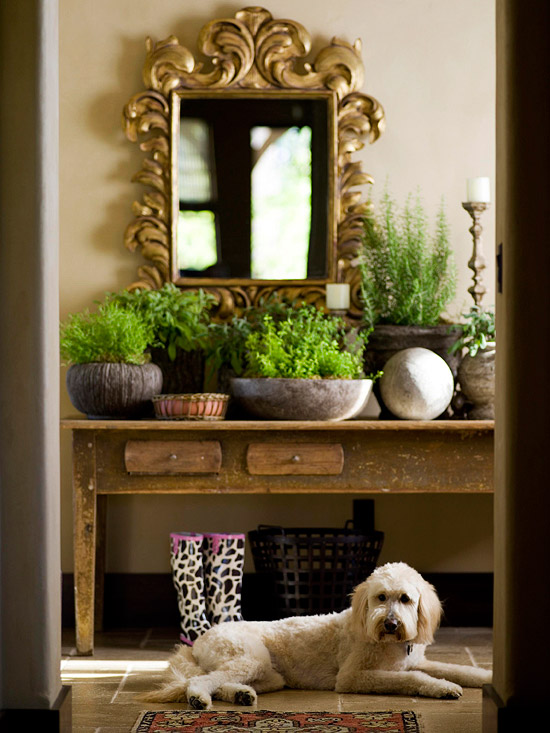






You don't need an estate to grow a gorgeous (and useful!) herb garden. Most herbs are perfect container garden plants and will thrive on your deck, patio, balcony, fire escape, or front steps, provided you offer them the right growing conditions.
First and foremost, herbs need full sun for best performance. Place your containers in locations that receive at least eight hours of direct sun. Grow indoor herbs in the sunniest location you can find, but don't expect them to perform as well as they do outside.
Also, don't give your herbs too much love. Avoid the fertilizer; most herbs will give you the strongest fragrance and flavor if they're grown in lean soil. Likewise, water wisely; while most herbs prefer dry conditions, some need more moisture to thrive. Use a soil-less potting mix to provide excellent drainage and space for roots to grow.
Perennial herbs can survive in containers outdoors year-round if the pots are large enough (holding at least 5 gallons of soil), have good drainage, and are hardy in your Zone. Use plastic pots; ceramic or clay containers will often crack from freeze-thaw cycles. Or lift your perennial herbs from pots and transplant them into the garden in late summer, giving the herb enough time to establish a new root system to survive winter. You can also treat container-grown perennial herbs as annuals, discarding them at the end of the season.

Basil, a beloved Italian annual herb, grows best in full sun and fertile, moist soil. Once the root system is established, about six weeks after sowing, it tolerates short periods of drought. Basil is a good companion with parsley, thyme, and other herbs when grown in a pot that holds at least 5 gallons of soil. For small containers, choose a compact variety such as 'Spicy Bush'.
Learn more about basil.
Chives are grassy, clump-forming perennials with hollow leaves. Essentially tiny onions, chives are grown for their leaves and blooms rather than their bulbs. Their fragrant pink-purple spring flowers are also edible. Plant them in well-drained potting soil that's rich with organic matter. They can tolerate light shade but do best in full sun. Chives grow well in container gardens. Because they're hardy in Zones 3-10, you can leave them outdoors year-round.
Learn more about chives.
Cilantro, also known as coriander, can be used for its tangy leaves or its dried, ground seeds. Plant this annual herb in well-drained soil. Cilantro grows best in sun, although it tolerates some shade. Because it has a long taproot, place it in a container garden that is at least 12 inches deep.
Learn more about cilantro.
Tarragon is a classic French herb used to season fish and many other foods. Its name is derived from the French word for little dragon, referring to the herb's bold flavor. Plant it in full sun and well-drained potting mix. It tolerates drought well and should not be overwatered. Tarragon grows in partial shade but does best in full sun. Zones 5-9
Learn more about tarragon.
Lavender is a bushy perennial shrub that does best in full sun and well-drained potting mix. Keep it on the dry side and avoid fertilizer. Lavender hardiness depends on the variety; the toughest are hardy in Zones 5-10.
Learn more about lavender.
Lemon balm, an old-fashioned favorite that spreads freely and self-sows readily, is perfect for container gardens so it doesn't take over the yard. Plant in partial shade or full sun and in moist, rich, well-drained potting mix. Zones 3-10
Learn more about lemon balm.
Lemon verbena is a tropical shrub (hardy in Zones 9-10) that's commonly grown as an annual in container gardens. Plant nursery-grown plants in pots filled with well-drained potting mix. Avoid fertilizer; lemon verbena grows best with few nutrients. It prefers full sun.
Learn more about lemon verbena.
Marjoram, an oregano relative, has a sweeter, milder flavor and aroma than its cousin. Grow it in full sun and well-drained potting mix. It's perennial in Zones 8-10, so gardeners in colder areas can grow it in container gardens indoors over winter.
Learn more about marjoram.
Mint is such a vigorous plant that it will become invasive unless it is confined in a pot. Grow it in full sun or partial shade. Mint can grow in many soil types and degrees of sunlight, but it produces the best leaves in rich soil. It's a perennial, but its hardiness varies by variety, so check which type you are growing.
Learn more about mint plants.
Oregano is an essential ingredient in Mediterranean cuisines. The plant is a shrubby perennial that does best in full sun and well-drained potting mix. The more sun oregano receives, the more pungent the flavor of the leaves. It does not tolerate wet soil. Zones 5-10
Learn more about oregano.
Rosemary, a Mediterranean evergreen shrub, likes hot, dry, sunny spots. Quick-draining soil is the key to good growth. It's drought-tolerant. Keep the soil moist but never wet when grown indoors. Zones 7-10
Learn more about rosemary.
Sage is a favorite for seasoning poultry. Best grown in full sun and moist, well-drained potting mix, sage is perfect for adding structure to container gardens. Most, but not all, varieties are hardy in Zones 4-10.
Learn more about sage.
Thyme comes in many varieties, but all grow best in full sun and well-drained soil. Thyme does not tolerate wet soil, so avoid over-watering. Zones 4-10
Learn more about thyme.
Copyright © www.100flowers.win Botanic Garden All Rights Reserved